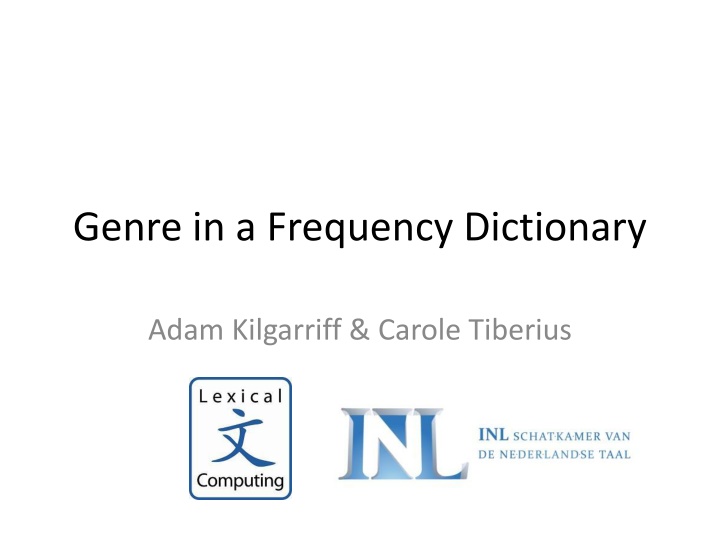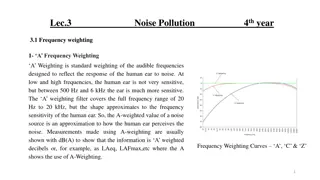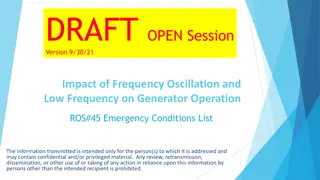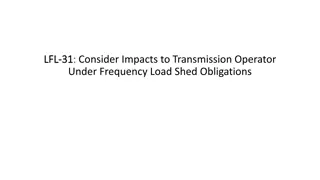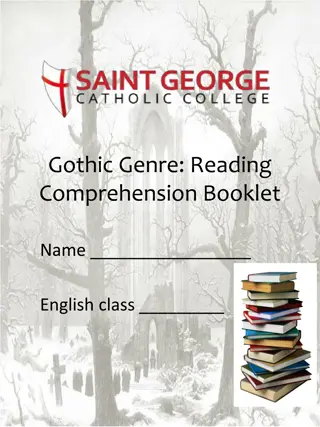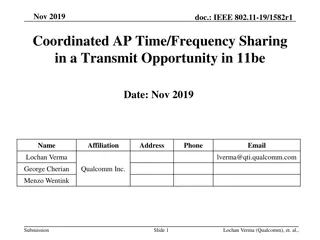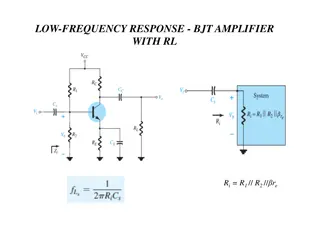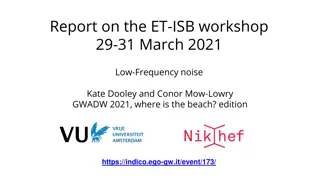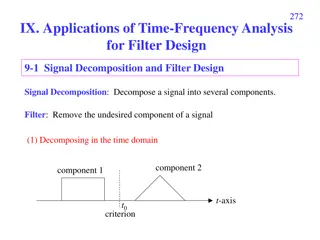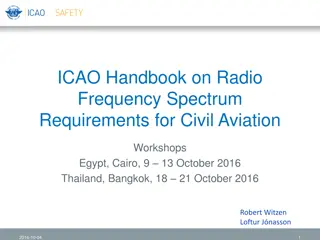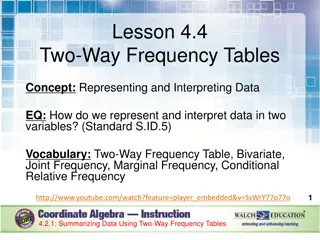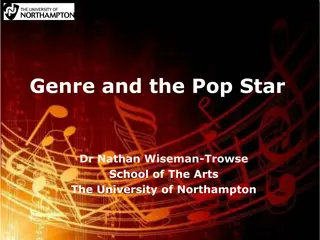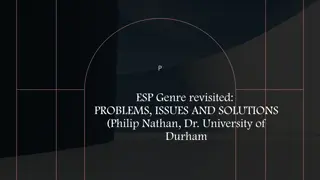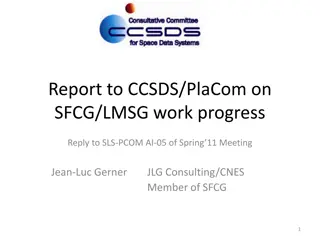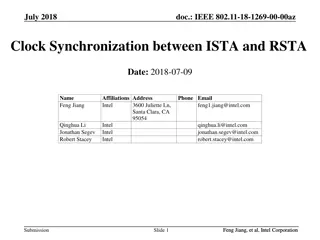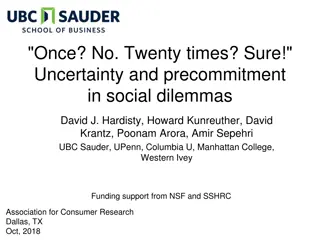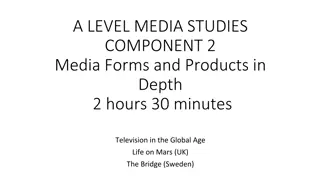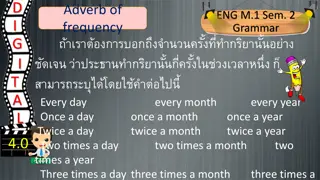Genre in a Frequency Dictionary: Solutions and Dilemmas
A comprehensive look at genre analysis within frequency dictionaries, tackling key issues such as sample representation and word frequency. Explore the genius of fixed sample sizes, the challenges of rare word usage, and the importance of categorizing lists by genre.
Download Presentation

Please find below an Image/Link to download the presentation.
The content on the website is provided AS IS for your information and personal use only. It may not be sold, licensed, or shared on other websites without obtaining consent from the author.If you encounter any issues during the download, it is possible that the publisher has removed the file from their server.
You are allowed to download the files provided on this website for personal or commercial use, subject to the condition that they are used lawfully. All files are the property of their respective owners.
The content on the website is provided AS IS for your information and personal use only. It may not be sold, licensed, or shared on other websites without obtaining consent from the author.
E N D
Presentation Transcript
Genre in a Frequency Dictionary Adam Kilgarriff & Carole Tiberius
Outline Three problems Our solutions
Routledge Frequency Dictionaries Ten languages/volumes so far Series editors: Mark Davies, Paul Rayson 5000 most frequently used words Genre/text type? Some marking Like traditional dictionaries
The corpus linguists dilemma We know that Everything depends on text type Usually Ignore Pretend our corpus is representative (or we even knew what it meant) Frequency dictionary Specially painful
Poetic interlude As many texts as stars in the sky As many domains as constellations As many genres as stories to tell about them Represent them? Shucks
A tiny step in the direction of respecting the importance of genre Instead of just one list One list per genre
The Whelks Problem Rare word but a book about whelks uses it hundreds of times Solution document frequency
The genius of Brown Fixed sample size 500 x 2000-word samples Makes the maths easy Frequencies directly comparable Document frequency works No need to compensate for different sample length Contra Sinclair, Hanks Different goals Brown: very widely used, replicated
A Frequency Dictionary of Dutch http://images.tandf.co.uk/common/jackets/amazon/978041552/9780415523790.jpg In the Routledge series Publication later this year
Dutch http://66.147.242.97/~biofides/wp-content/uploads/2011/02/nederland_vlaanderen.jpg Written and Spoken the Netherlands and Flanders http://www.markenramona.nl/mr/omweg/prive/pinpas.gif jij, je pinpas betaalkaart gij, ge
The Corpus Fiction 25 books per year, 1970-2009 Newspapers From SONAR corpus, 1993-2005. Spoken From Corpus Gesproken Mederlands Web From SONAR corpus, includes blogs, discussion lists, e-magazines, press releases, websites and wikipedia http://www.wiskundemeisjes.nl/wp-content/uploads/2007/04/nrc.jpg http://upload.wikimedia.org/wikipedia/meta/6/62/Wiki-logo-big-nl.png
Corpus preparation Tagging Lemmatisation http://ilk.uvt.nl/frog/ Slice corpora into 2000-word samples
How many lists? One list per genre But overlap? Core: 4 genres: General:
Which words to include Which list(s) to put them in Throughout document frequency, implemented as percentage of samples that the word occurs in
Inclusion Include if average across four genres > 1.125 5000 words
Core Vocabulary words that are used across all kinds of language implemented as Words with frequency > x in all genres 90 50 30 10 5 4.5 4 3 x # 36 112 190 477 856 943 1039 1345 4.5 mark gives 943 core-vocab words in core-vocab only; not in other lists
Which list(s)? The problem Word Fiction News Spoken Web Ham 20 5 4 3 Egg 20 18 4 3 Cheese 20 18 19 3
Which list(s)? The problem Word Fiction News Spoken Web Ham 20 5 4 3 Egg 20 18 4 3 Cheese 20 18 19 3 Our solution Word Fiction News Spoken Web Lists Ham 20 5 4 3 Fiction Egg 20 18 4 3 Fiction, News Cheese 20 18 19 3 General
Algorithm Minimum > 45.5 The complication is that some words will occur in two, three or four of the lists generated in this way, and for such cases we have to decide whether they go in: just one list more than one list the general list. Our strategy is to say there should be some cases of each, as follows: if highest frequency is at least double the next highest, list in that genre only if two are high and two are low, that is, the first- and second-highest, and both more than double the other two, list in both the top two else list in general.
Algorithm Min > 4.5? Core-vocab Else If highest-score > 2 x second-highest-score Highest-score-genre Else if second-highest-score > 2 x third-highest-score Highest-score-genre and second-highest-score-genre Else General
The genre lists This genre only This genre and one other Total 822 262 1084 Fiction 564 565 1129 Newspaper 64 92 156 Spoken 105 419 524 Web
Observations Fiction Broadest vocabulary, longest list Spoken Smallest, shortest Spoken and web: much overlap Fiction and news: some overlap
In sum Everything depends on genre Not easy to handle well in any dictionary Specially hard in a frequency dictionary It helps to use Fixed sample size Document frequencies (as percentages) A modest attempt to pay genre due respect Routledge Frequency Dictionary of Dutch, 2013
Poetic interlude As many texts as stars in the sky As many domains as constellations As many genres as stories to tell about them Represent them? Shucks
